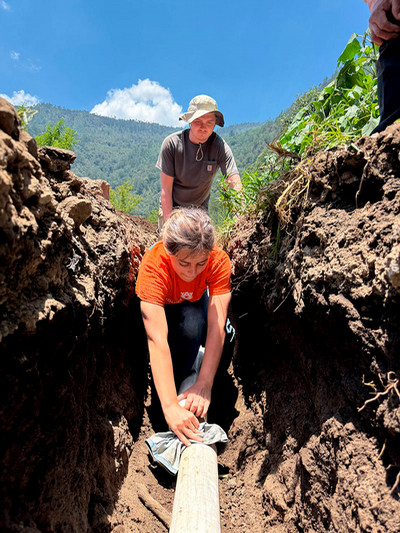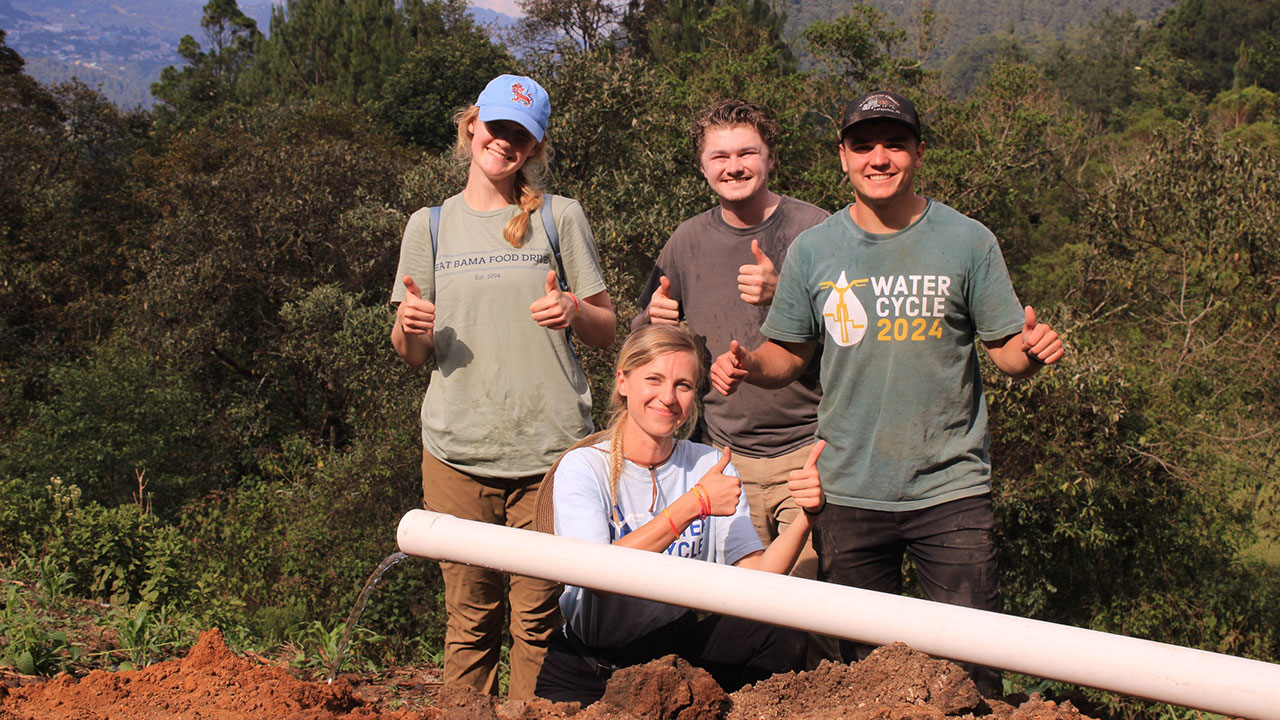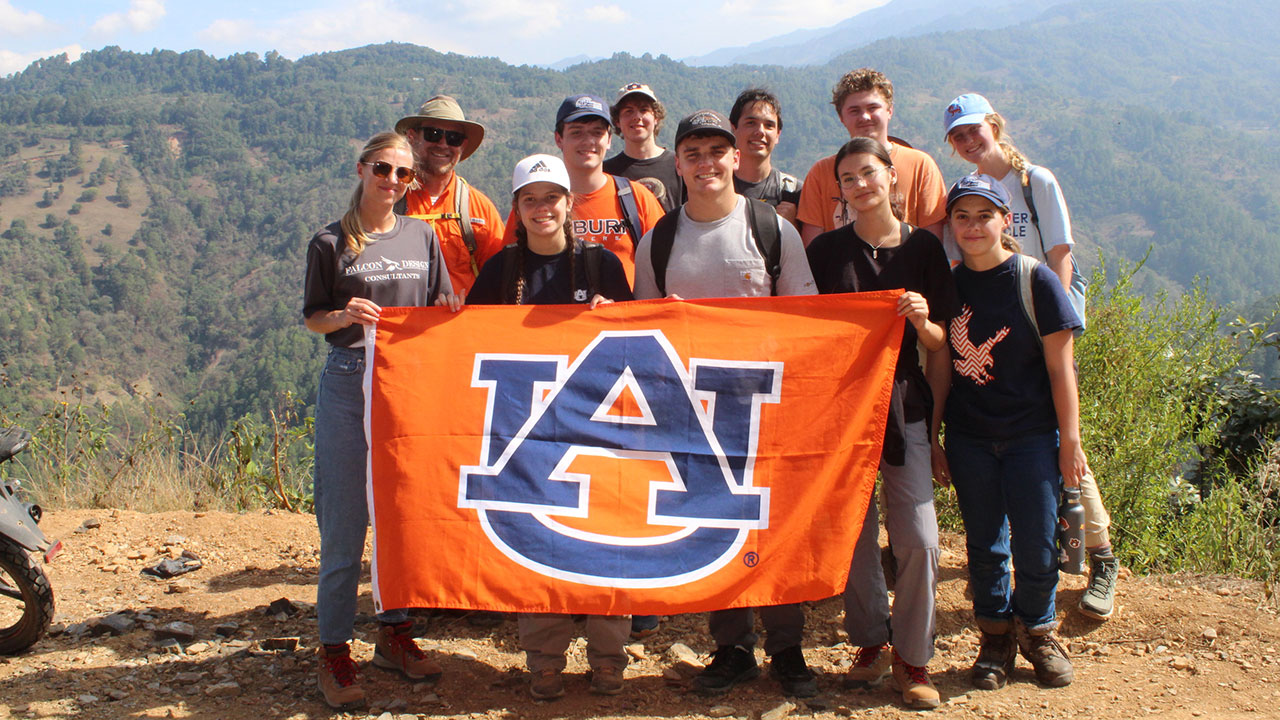'Build something that matters': Auburn Engineers Without Borders student chapter changing lives in Central America
Published: Jun 24, 2025 11:00 AM
By Joe McAdory
The numbers speak for themselves.
Members of Auburn University’s Engineers Without Borders (EWB) student chapter recently installed more than 6,000 feet of pipe — infrastructure capable of delivering clean, running water to hundreds of homes — that reached more than 1,000 villagers living in remote, Guatemalan mountain terrain.
“Once we were finished, I turned around and looked up the mountain,” said Sydney Watwood, a sophomore in chemical engineering and Auburn-EWB secretary/treasurer. “That’s when the surrealness of what we accomplished hit me. You’re just doing the work, getting into a rhythm — but then you stop and realize what it means to see water flowing through that pipe.”
Owen Reynolds, a senior in aerospace engineering and water distribution sub-team lead, experienced a similar moment of clarity.

“We’ve been looking at this project on a map for months, then we’re there — and it’s no longer a dot on the page,” he said. “It’s actual people. Real houses. Real lives. It’s an amazing feeling to think that these people have water every day because of the design work we did at Auburn and the implementation of that design in Guatemala.”
EWB is a student-led, service-oriented engineering organization that partners with underserved communities — domestically and internationally — to design and implement sustainable infrastructure projects focused on water, sanitation, and other basic human needs. Chartered in 2014 after working in Bolivia since 2008, the chapter is part of the larger EWB-USA network and equips students with real-world experience. Through projects like Guatemala (clean water), Bolivia (irrigation and potable systems), and regional domestic efforts, Auburn-EWB blends hands-on engineering, community collaboration, and student leadership to transform lives.
During a whirlwind two-week trip in May, Auburn-EWB’s first stop was Xeo, Guatemala, the site of last spring’s project. There, the team met with the local water committee, interviewed community members and thoroughly inspected the system. The 2024 system — the most complex ever designed by the Auburn chapter — includes two water reservoirs, nine pressure break tanks and 167 household connections. Not only was the system operating flawlessly, but feedback from the community was overwhelmingly positive.
Significantly, the team was able to collect a year’s worth of water meter readings — a first for Auburn-EWB. These readings confirmed that their original consumption estimates, based on the World Health Organization’s projection of 100 liters per person per day, were remarkably accurate.
Much of the team’s time was then spent in Parramos Grande, where a two-phase approach is being used. Phase 1, completed on this trip, included installing 1,942 meters (approximately 6,370 feet) of 3- and 4-inch diameter PVC pipe from the mountain spring to a new 2,500-liter pressure break tank and a 20,000-liter ferrocement storage tank. Both tanks were leak-tested and optimized for balanced flow.
Phase 2 — designing and building the household distribution network — began with data collection. Teams gathered GPS data to identify every home’s service connection, flew drones to generate detailed topographic maps, tested water quality, and conducted interviews with residents to better understand community priorities. Their preparation paid off — all work was completed ahead of schedule and laid the foundation for what will be completed in 2026.
“Though the mission of EWB is to help people meet their basic human needs, at Auburn University our mission is to educate students,” said Christian Brodbeck, Auburn-EWB faculty advisor and director of research operations at the college. “You learn so much by being there, being in the trenches and connecting with the people you serve. That’s what helps shape who you are.”
Auburn-EWB has 60 active student members and is advised by faculty within the Samuel Ginn College of Engineering, including Brodbeck; senior lecturer in mechanical engineering Tom Burch (Bolivia); professor in civil and environmental engineering Jose Vasconcelos (Guatemala); lecturer in mechanical engineering Joseph Ragan (Bolivia); associate professor in civil and environmental engineering Jack Montgomery (Bolivia); and research associate in civil and environmental engineering Gerald John (domestic).

In August, eight students and advisors will continue Auburn-EWB’s 2024 mission in Quesimpico, Bolivia, where they will repair water transmission lines and design an improved irrigation system.
Watwood chose Auburn for opportunities like this.
“I’ve dreamed of designing water systems since I was 12 years old, but I didn’t realize that I would be doing it this soon,” she said. “EWB gave me the chance to use my hands and build something that matters. That was a totally different and powerful experience.
“Members of the community were down in the trenches with us, helping us glue the pipe together. There were even moments when they questioned why we were doing it — because they really wanted to. It meant so much to them.”
Reynolds said the experience transcended traditional engineering lessons.
“We started with just some random GPS points, and we saw how that turned into every step of the design process, to construction and to a working system,” Reynolds said. “That’s what I think helps give you experience across every step — even outside your normal discipline.”
Though trained in aerospace engineering, Reynolds was immersed in bill of materials development, project management and reporting — lessons with lifelong applications.
“This project taught me far more than I could have learned in a classroom,” he said. “You’re learning logistics, infrastructure, communication. It showed me how important it is to understand the full life cycle of a project — from a conceptual idea to a real, functioning system that changes lives.”
Brodbeck, who grew up in Guatemala, said the students’ work ethic stood out.
“The NGO we were working with said, ‘We’re not used to having student teams come here and actually work,’” Brodbeck said. “I told them, ‘As long as I’m advising, I’m not going to bring people to stand around and manage. We bring people to help.’”
The impact in Guatemala is already etched into students’ memories — not only through the infrastructure they built but through community relationships and even handmade gifts.
“For all the girls, villagers put together shawls. And for all the guys, they made these handmade bags,” Watwood said. “This was for a going-away ceremony, and afterward all the villagers came out, wanted pictures and wanted to talk to us before we left. That day reminded me that these people are why we’re here.”
Reynolds keeps his bag in his Auburn bedroom.
“It’s a tangible reminder of the people that were impacted,” he said. “Maybe one day I’ll be in an office or a lab, and it’s just more difficult to see the people I’m impacting. But I can always look back and remember how grateful they were.”
It’s a mindset Watwood says she’ll carry for the rest of her life.
“I think that 10 to 20 years down the road, no matter what I’m doing, it’ll be easy to get wrapped up in calculations,” she said. “But it’ll be most important to remember that there are groups of people who are impacted by your work.”
Media Contact: , jem0040@auburn.edu, 334.844.3447
Auburn's Engineers Without Borders student chapter visited the Guatemalan villages of Xeo and Parramos Grande in May. Student teams return to Bolivia this summer.






